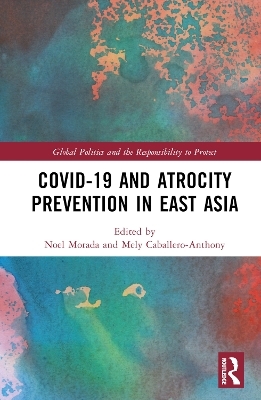
Covid-19 and Atrocity Prevention in East Asia
Routledge (Verlag)
978-1-032-30967-5 (ISBN)
The book brings together selected case studies in Southeast Asia and the wider East Asian region that analyse how states in the region have responded to the pandemic and its multi-dimensional threats to human security, including risks of atrocity crimes. In the context of protecting human security and upholding the Responsibility to Protect (R2P), the work analyses how such a consequential crisis has compounded socio-economic and political problems, exacerbated societal fault lines, and created new types of risks for people’s safety and security. Using the United Nations Framework of Analysis for Atrocity Crimes: A Tool for Prevention, the book presents seven case studies that identify relevant risks factors confronting selected countries and the extent to which the global pandemic has magnified and/or exacerbated such risks for affected populations. It draws key lessons on how states should manage extant and emerging risks for atrocity crimes and how they can build and enhance their capabilities for preventing atrocities in both conflict-affected and relatively stable states, particularly within the context of Pillar 1 (prevention) and Pillar 2 (capacity building) of the R2P principle.
This book will be of much interest to students of the Responsibility to Protect, humanitarian protection, Asian politics, International Relations, and Security studies.
Mely Caballero-Anthony is Professor of International Relations and holds the President’s Chair of International Relations and Security Studies at Nanyang Technological University (NTU), Singapore. She is also Head of the Centre for Non-Traditional Security Studies at the S. Rajaratnam School of International Studies (RSIS), NTU. Noel M. Morada is a Senior Fellow and Director (Regional Diplomacy and Capacity Buidling) at the Asia Pacific Centre for the Responsibility to Protect, School of Political Science and International Studies, The University of Queensland St. Lucia, Australia.
1. Introduction: COVID-19, Responsibility to Protect and Pathways toward Human Security 2. Indonesia: COVID-19 and Risk of Atrocity 3. Myanmar: COVID-19 and Militarisation Spiral into Atrocity Crimes 4. The Philippines: A Feminist Analysis of Atrocity Prevention and Pandemic Response 5. Singapore: Migrant Workers, A Vulnerable Community during COVID-19 6. China: Risk and Vulnerability during COVID-19 7. Japan: COVID-19 and the Vulnerable 8. Korea: COVID-19, the Vulnerable and Protection 9. Conclusion: COVID-19 and Its Implications for Atrocity Prevention in East Asia
| Erscheinungsdatum | 30.11.2022 |
|---|---|
| Reihe/Serie | Global Politics and the Responsibility to Protect |
| Zusatzinfo | 7 Tables, black and white; 3 Line drawings, black and white; 3 Illustrations, black and white |
| Verlagsort | London |
| Sprache | englisch |
| Maße | 156 x 234 mm |
| Gewicht | 598 g |
| Themenwelt | Sozialwissenschaften ► Politik / Verwaltung ► Europäische / Internationale Politik |
| ISBN-10 | 1-032-30967-9 / 1032309679 |
| ISBN-13 | 978-1-032-30967-5 / 9781032309675 |
| Zustand | Neuware |
| Haben Sie eine Frage zum Produkt? |
aus dem Bereich


